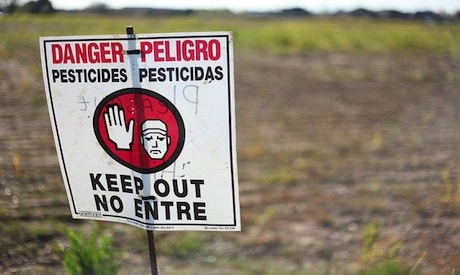

The recent death of twenty-three school children in Bihar, India was heartbreaking. Buckets once used to store pesticides were then filled with cooking oil that was used in the kids' meals.
While the country does have some restrictions on genetically modified crops, it's still using dozens of pesticides that much of the rest of the world does not use. Small villagers and farmers uneducated about the risks associated with exposure to the chemicals make poor decisions, like reusing buckets to provide food for children. The pesticide levels found in the cooking oil were reportedly five times the strength of what would be sold in the marketplace.
More than fifty children fell ill, also in Bihar last week, after drinking contaminated water at school. No deaths have been reported. In 2012, nearly forty Mexican children were sent to the ER because of pesticide poisoning. Three Peruvian children died and more than fifty fell ill in 2011 after eating food contaminated with high levels of pesticides.
Read more about pesticide exposure
While these are international occurrences we think only happen only outside of the U.S., the EPA reports that at least 70,000 calls each year made to Poison Control Centers are a result of exposure to common pesticides.
According to the Pesticide Action Network of North America, U.S. farm workers are also routinely exposed to high levels of pesticides and herbicides-often being sprayed on crops while fruits and vegetables are being picked. The problem is particularly high amongst illegal workers who have little to no benefits from their employers. Barry Estabrook detailed a high number of birth defects in children born to immigrant tomato pickers in Florida in his book "Tomatoland: How Modern Industrial Agriculture Destroyed Our Most Alluring Fruit ", and Tracie McMillan, who worked undercover on California farms, also experienced pesticides being sprayed while working in fields for her book "The American Way of Eating".
"[L]ittle is done to address the dangers of pesticide exposure faced daily by families who cross the border to harvest US strawberries, apples or broccoli," reports PANNA.
According to MSN, the EPA recently approved an increase on the amount of glyphosate allowed on crops, "new allowable levels on crops such as flax and soybeans have been increased from 20 parts per million to 40 ppm." Glyphosate is an herbicide commonly used on genetically modified crops. Some of the most pervasive crops grown in the U.S. are glyphosate dependent including corn, soy, canola, alfalfa, cotton and sugar beets.
And while U.S. children may be spared cooking oil soaked in pesticide residue, the risks of exposure are still very real. The Environmental Working Group outlines the most and least sprayed fruit and vegetable crops each year in their Dirty Dozen and Clean 15 lists, which are based on pesticide data collected from the USDA. Choosing organic food may not protect you completely from pesticide exposure, but it can decrease the risks for you and your family.
Read more about organic fruits and vegetables
Image: Valley Photographs




